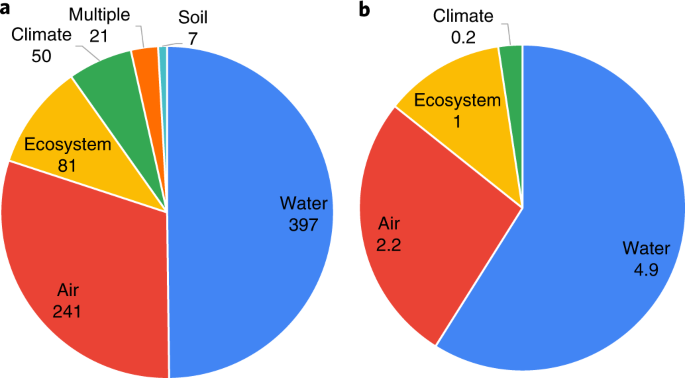
Fowler, D. et al. Effects of global change during the 21st century on the nitrogen cycle. Atmos. Chem. Phys. 15, 13849–13893 (2015).
Sutton, M. et al. in Frontiers 2018/19: Emerging Issues of Environmental Concern (ed. UNEP) Ch. 4 (UNEP, 2019).
Galloway, J. N. et al. The nitrogen cascade. BioScience 53, 341–356 (2003).
Lade, S. J. et al. Human impacts on planetary boundaries amplified by Earth system interactions. Nat. Sustain 3, 119–128 (2020).
Steffen, W. et al. Planetary boundaries: guiding human development on a changing planet. Science 347, 1259855 (2015).
Davidson, E. A. & Kanter, D. Inventories and scenarios of nitrous oxide emissions. Environ. Res. Lett. 9, 105012 (2014).
Sustainable Nitrogen Management Resolution UNEA/EA.4/L.16 (United Nations Environment Assembly, 2019).
Colombo Declaration on Sustainable Nitrogen Management. United Nations Global Campaign on Sustainable Nitrogen Management (United Nations, 2019).
Sutton, M. A. et al. The European Nitrogen Assessment (Cambridge Univ. Press, 2011).
Tomich, T. P., Brodt, S. B., Dahlgren, R. A. & Scow, K. M. (eds) The California Nitrogen Assessment: Challenges and Solutions for People, Agriculture, and the Environment (Univ. of California Press, 2016).
Abrol, Y. P. et al. The Indian Nitrogen Assessment: Sources of Reactive Nitrogen, Environmental and Climate Effects, Management Options and Policies (Elsevier, 2017).
Kanter, D. R. & Brownlie, W. J. Joint nitrogen and phosphorus management for sustainable development and climate goals. Environ. Sci. Policy 92, 1–8 (2019).
Policies Database (International Energy Agency, 2019); https://www.iea.org/reports/world-energy-model/policies-database
Climate Policy Database (NewClimate Institute, 2015); http://climatepolicydatabase.org/index.php/Climate_Policy_Database
Department of Environmental Affairs National Biodiversity Strategy and Action Plan (Republic of Botswana, 2016).
Terms and Procedure for Registration of Inorganic Fertilizer Regulation of the Minister of Agriculture of RI Number 43/Permentan/SR.140/8/2011 (Republic of Indonesia, 2011).
Sobota, D. J., Compton, J. E., McCrackin, M. L. & Singh, S. Cost of reactive nitrogen release from human activities to the environment in the United States. Environ. Res. Lett. 10, 025006 (2015).
Kanter, D. R. Nitrogen pollution: a key building block for addressing climate change. Clim. Change 147, 11–21 (2018).
Velthof, G. L. et al. The impact of the nitrates directive on nitrogen emissions from agriculture in the EU-27 during 2000–2008. Sci. Total Environ. 468, 1225–1233 (2014).
Aillery, M. et al. Managing Manure to Improve Air and Water Quality Economic Research Report 9 (USDA Economic Research Service, 2005).
Xepapadeas, A. The economics of non-point-source pollution. Annu. Rev. Resour. Econ. 3, 355–373 (2011).
Drawing Down N 2O to Protect Climate and the Ozone Layer: A UNEP Synthesis Report (UNEP, 2013).
Global Non-CO 2Greenhouse Gas Emission Projections & Mitigation: 2015–2050 (EPA, 2019).
Robertson, G. P. et al. Nitrogen–climate interactions in US agriculture. Biogeochemistry 114, 41–70 (2013).
Kanter, D. R. et al. A framework for nitrogen futures in the Shared Socioeconomic Pathways. Glob. Environ. Change 61, 102029 (2020).
Rao, S. et al. Future air pollution in the Shared Socio-economic Pathways. Glob. Environ. Change 42, 346–358 (2017).
Food and Agriculture (OECD, 2012).
USDA Agricultural Projections to 2022 (USDA, 2013).
Nemet, G. F., Holloway, T. & Meier, P. Implications of incorporating air-quality co-benefits into climate change policymaking. Environ. Res. Lett. 5, 014007 (2010).
Senet, S. First European agreement on recycled fertilisers. EURACTIV (19 December 2018); https://go.nature.com/31bKSH3
Erisman, J. W., Bleeker, A. & van Jaarsveld, J. A. Evaluation of ammonia emission abatement on the basis of measurements and model calculations. Environ. Pollut. 102, 269–274 (1998).
Oenema, O. et al. Nitrogen Use Efficiency (NUE): An Indicator for the Utilisation of Nitrogen in Agriculture and Food Systems (Wageningen Univ., 2015).
Coggan, A., Whitten, S. M. & Bennett, J. Influences of transaction costs in environmental policy. Ecol. Econ. 69, 1777–1784 (2010).
Oenema, O. et al. in The European Nitrogen Assessment (eds Sutton, M. A. et al.) Ch. 4 (Cambridge Univ. Press, 2011).
Kanter, D. R. & Searchinger, T. D. A technology-forcing approach to reduce nitrogen pollution. Nat. Sustain. 1, 544–552 (2018).
Stuart, D., Schewe, R. L. & McDermott, M. Reducing nitrogen fertilizer application as a climate change mitigation strategy: understanding farmer decision-making and potential barriers to change in the US. Land Use Policy 36, 210–218 (2014).
Reimer, A. P., Denny, R. C. H. & Stuart, D. The impact of federal and state conservation programs on farmer nitrogen management. Environ. Manage. 62, 694–708 (2018).
Kanter, D. R. et al. Nitrogen pollution policy beyond the farm. Nat. Food 1, 27–32 (2020).
Booth, S. Analysis of Existing Environmental Policy Databases (UNEP, 2017).
Sutton, M. A. et al. Our Nutrient World: The Challenge to Produce More Food and Energy with Less Pollution. Global Overview of Nutrient Management (Centre for Ecology and Hydrology, Edinburgh on behalf of the Global Partnership on Nutrient Management and the International Nitrogen Initiative, 2013).
Source: Ecology - nature.com


